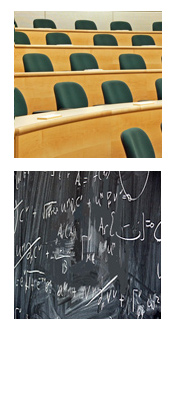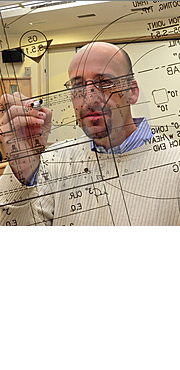7.26.2007
LEIBNIZ UNIVERSITY ALUMNI AGORA'
Preferential channels are set up within the Web to allow the students to come together once a week and exchange business information and tips. Equally Alumni gather of their own free will once or twice a year for a sabbatical week end where they pick up old friendships, exchange information and generally have a good time. Venues of the meetings may change from the USA to Europe. The last meeting was held in Florida during the summer 2004 and the one before that was held in Edinburgh, UK.
One of the favourite activities of the ex alumni belonging to the Agorà is mentoring. They voluntarily decide to help, follow and sustain one young student and guide him/her through the hurdles of life not just in an academic way. This action develops very strong ties between people who keep in touch and sustain and help the other.
7.25.2007
Leibniz University - The research activity
7.23.2007
LEIBNIZ UNIVERSITY
LEIBNIZ UNIVERSITY
 Leibniz University Institute of Arts and Science is a virtual learning place of global reach and spirit. As such it is open to all those who are interested in acquiring a knowledge free of the constrictions of a traditional institution.
Leibniz University Institute of Arts and Science is a virtual learning place of global reach and spirit. As such it is open to all those who are interested in acquiring a knowledge free of the constrictions of a traditional institution.
LEIBNIZ UNIVERSITY POST
LEIBNIZ UNIVERSITY
With more than 60 interdisciplinary and practice-orientated courses of
study, LEIBNIZ UNIVERSITY of Hannover provides degree and continuing
education courses which are orientated both towards demand and
quality [...]
LEIBNIZ UNIVERSITY
The Leibniz University settled in Hannover (German Gottfried Wilhelm
Leibniz Universität Hannover) is a university located in Hanover,
Germany. It was founded in 1831 and is organized in nine faculties.
[...]
LEIBNIZ UNIVERSITY
With the establishment of new courses of study, such as Applied, Computer Science, Life Science, Computer-aided Engineering, Plant Biotechnology or Industrial Engineering, Leibniz University of Hannover has reacted to the changing demands of the employment market and offers a range of subjects rarely found in Germany.
[...]
LEIBNIZ UNIVERSITY
For graduates today, in addition to the academic qualification,
LEIBNIZ UNIVERSITY of Hannover is absolutely essential to think in
terms of interdisciplinary, networked systems. The large choice of
subjects at Leibniz Universität Hannover permits students to shape
their studies individually through a large number of possible
combinations.
[..]
7.21.2007
LEIBNIZ UNIVERSITY
LEIBNIZ UNIVERSITY, che nel corso degli anni ha ottenuto vari riconoscimenti da parte delle autorità del New Mexico e della Città di Santa Fe, acquista rinomanza come "centro per lo studio dell’arte" vantando tra i suoi docenti nomi illustri, fra i quali spiccano il pittore Alexander Shundi e lo scultore Kardash Onnig la cui fama è riconosciuta a livello internazionale.
LEIBNIZ UNIVERSITY è una università privata che si è specializzato inizialmente nella ricerca artistica e poi in quella scientifica e umanistica divenendo un modello per il moderno sistema didattico. Le riforme introdussero i corsi a numero chiuso, gli esami di selezione per l'accesso e si strutturò preferendo classi composte di pochi studenti. L'influenza di LEIBNIZ UNIVERSITY si diffuse fra gli operatori della formazione statunitensi, e oltre agli altri college, ne presero spunto anche le scuole secondarie superiori.
LEIBNIZ UNIVERSITY - Faculty and department
The Departments within the Leibniz University are varied and cover different areas of knowledge: sociology, general business and business administration, journalism, tourism, legal studies, architecture, fashion and interior design.
A special course of studies in Leibniz University is dedicated to creative arts such as painting, sculpting, clay modelling, pottery.
The course of studies in Leibniz University is chosen by the student without any consideration of his prior knowledge of the subject or his studies.
The mission of the Leibniz University is to satisfy the desire of knowledge that most people possess and frequently stifle owing to the constriction of formal education.
Leibniz University has developed an efficient distance learning method that allows everybody to study at a pace that suits the learner and not the Institution.
7.17.2007
Gottfried Wilhelm von Leibniz
| ||||
LEIBNIZ UNIVERSITY INSTITUTE of ARTS and SCIENCE
 Leibniz University Institute of Arts and Science is a virtual learning place of global reach and spirit. As such it is open to all those who are interested in acquiring a knowledge free of the constrictions of a traditional institution. Leibniz educational approach is inspired by the classic Greek tradition of teaching liberally to all those who wanted to acquire knowledge without limitation of sex, age, previous education. In ancient times in Greece teaching took place in agorà which is to say in the main public square of a city. Students and teachers would sit down and discuss the subjects taught without any set framework. They would in turn speak and listen, argue and agree and exchange knowledge and expertise.
Leibniz University Institute of Arts and Science is a virtual learning place of global reach and spirit. As such it is open to all those who are interested in acquiring a knowledge free of the constrictions of a traditional institution. Leibniz educational approach is inspired by the classic Greek tradition of teaching liberally to all those who wanted to acquire knowledge without limitation of sex, age, previous education. In ancient times in Greece teaching took place in agorà which is to say in the main public square of a city. Students and teachers would sit down and discuss the subjects taught without any set framework. They would in turn speak and listen, argue and agree and exchange knowledge and expertise.Socrates used to say that we all know what we need to know. Knowledge just needs to be brought to the surface and the task of the teacher is to help the student discover his unknown knowledge. The spirit of the educational programmes of this institution is very much in line with this thought although modern times require that specific knowledge be taught: Leibniz replaces the old agorà and becomes a place where people can meet, discuss, teach and learn without limitations of space or time.
Technology has indeed helped in making this dream come true. The distance learning programmes are made possible by the most modern technologies so that students located in different parts of the world can share ideas, programmes, theories and techniques. Leibniz has achieved a sort of globalisation by teaching courses to students located in different corners of the world who virtually meet at lesson times or to find new and exciting inspirations.


 Trustees sought to find a name that would exemplify an international and interdisciplinary approach to education and learning. We arrived at the name of Leibniz from the seventeenth century mathematician, philosopher and political advisor Gottfried Wilhelm Leibniz.
Trustees sought to find a name that would exemplify an international and interdisciplinary approach to education and learning. We arrived at the name of Leibniz from the seventeenth century mathematician, philosopher and political advisor Gottfried Wilhelm Leibniz. Leibniz was a member of the Royal Academy of Science in London and the Academy of Sciences in Paris. He and Newton were elected as the first foreign members of the prestigious Parisian Academy of Sciences. In 1700, Leibniz induced King Frederick I of Prussia to found the Academy of Sciences in Berlin and Leibniz became the founding president.
Leibniz was a member of the Royal Academy of Science in London and the Academy of Sciences in Paris. He and Newton were elected as the first foreign members of the prestigious Parisian Academy of Sciences. In 1700, Leibniz induced King Frederick I of Prussia to found the Academy of Sciences in Berlin and Leibniz became the founding president.